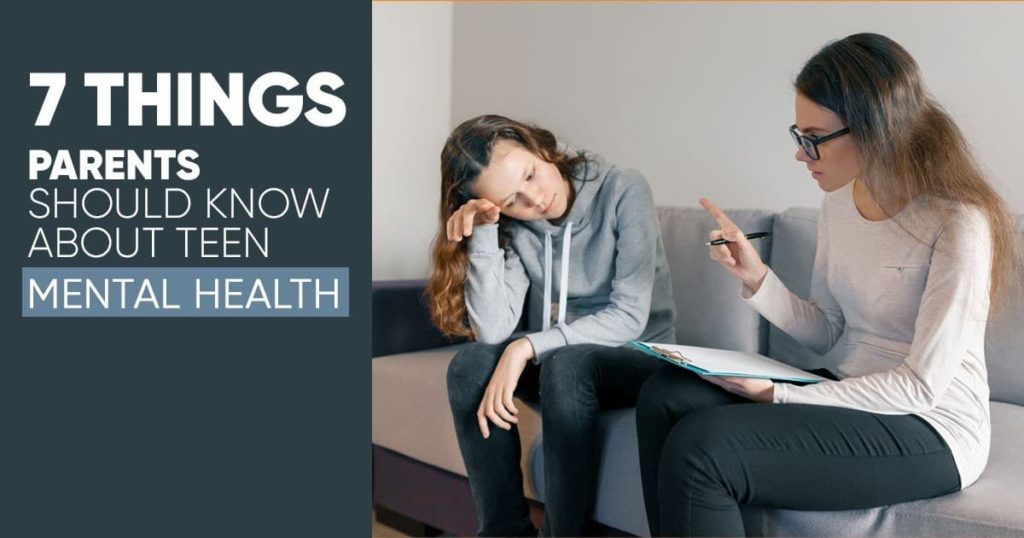When you’re a parent, you may not give much thought to teen mental health conditions or mental distress. You might attribute potential red flags in behavior to typical teen growing pains. As parents, it is essential to realize that some things might be real warning signs of mental health issues in teens.
By understanding more about the risks for teens regarding their mental health and the impact of social media, you’re better positioned to know what to watch for; you’re also more likely to be able to help your teen who is struggling.
Below are seven things parents should know about teen mental health and its implications.
1. Teen Experiences Are Critical Later in Life
As a parent, the first thing to note is that the years between 10 and 19 are developmentally critical. During this formative time, teens are going through so many changes physically, emotionally, and socially. Some of the things happening during this time can make teens especially vulnerable to a mental disorder. These factors include social pressure, substance abuse, or bullying.
Making sure you’re helping promote your teen’s psychological well-being during this time and protecting them from specific risk factors will help their physical and mental health when they’re adults.
“Protecting” doesn’t mean you can make every problem or issue go away, but what it does mean is that you’re a healthy support system for your teen. Teens need to have a safe place they can go to feel good when they’re experiencing problems, and if that’s their parent, it’s beneficial.
Mental Health Center of San Diego
2. Teens Face a Lot of Stress
It’s easy sometimes as a parent to minimize the stress teens are experiencing, but it’s genuine and can contribute to a mental health issue if not dealt with in a healthy, productive way.
Teens in their daily life may face social exclusion, educational problems, or they might be encouraged to participate in risky behaviors, just to provide a few examples.
There’s a lot of pressure on teens and school students to look a certain way and perform at a high level, whether academically or in sports. All of this pressure can be difficult to manage.
The COVID-19 pandemic has likely made this stress even worse for many teens with its many adverse effects.
3. Some Concerns in Teens Are More Common Than Others
Among teens and especially teenage girls, one of the most common types of mental disorder is an eating disorder. Eating disorders are especially likely to arise among teens as they compare themselves to their peers and people on social media. They may have an unrealistic idea of what their body should look like or body dysmorphia.
According to the National Eating Disorders Association, 20 million women and 10 million men will experience an eating disorder at some point in their life, like anorexia nervosa.
When a teen has an eating disorder, it can lead to mental and physical health complications, including malnutrition, heart attack, and organ failure.
Also common among teens are anxiety disorders and depressive symptoms, substance abuse, and self-harm.
Mental Health Center of San Diego
4. Warning Signs Can be Hard to Distinguish
Identifying possible warning signs of mental issues in teens can be challenging since they’re often attributed to angst or typical teen behavior. Some of the potential warning signs that there might be a deeper issue can include:
- The symptoms teens experience are distracting to them throughout all areas of their life.
- A relatively rapid decline in academic performance may tell you something is going on.
- Withdrawal from social activities or extracurricular activities may indicate a problem or your teen experiencing difficult times.
- Teens who are dealing with symptoms of a mental disorder may isolate themselves or struggle to maintain relationships.
- A teen may indicate they think about hurting themselves.
- Moods may be out of control or very up and down. A teen struggling may not have the self-regulation skills to deal with their moods appropriately. Teens may also show symptoms of bipolar disorder, with alternating periods of mania and depressive disorders.
5. You Can Protect Your Teen by Understanding the Warning Signs of Suicide
The last thing you want to think of as a parent is the potential your child could be considering suicide, but the reality is no teen is immune from this risk. Some factors can make some teens more vulnerable than others.
Teens who die by suicide very frequently have a mental disorder. It can also be more difficult for teens to see things from a long-term perspective, so something like the end of a relationship can make it hard for them to see any sort of light at the end of the tunnel.
Along with a psychiatric disorder like anxiety or symptoms of depression, a history of trauma or violence exposure and a substance use disorder are suicide risk factors in teens. Other risk factors include access to the means to kill oneself, such as firearms, conflict with friends or family, being a sexual minority, and being adopted.
Warning signs of suicide or suicidal ideation in teens include:
- Talking about or writing about suicide
- Withdrawal from friends, family, and other social contacts
- Extreme mood swings
- Drug or alcohol abuse
- Seeming to feel hopeless or helpless
- Changes in daily routines, such as in sleeping or eating patterns
- Giving away belongings for no apparent reason
- Personality changes
If you think your teen is suicidal, you should contact a suicide hotline number right away. If your teen could be thinking about it, you should also talk with them openly, honestly, face to face without being afraid to mention suicide.
6. There Are Effects of Social Media
Many parents cannot fully grasp what social media platforms can do to your mental wellness when you’re an impressionable teen because it’s not something we had.
How does social media affect teen mental health? Risks of teens social media usage, in general, include distractions, sleep disruptions, and exposure to rumors, bullying, negative body image, and unrealistic ideas of other people’s lives. The more teens use social media, research shows, the greater their risk of mental illness and potential negative effects.
For example, a 2019 study found among teens 13 to 16 from the National Institute of Mental Health, the time spent by young people using social networks or having screen time of more than three hours per day was a predictor of poor mental well-being.
There have been numerous other studies linking social media account use with anxiety and depression.
You can help protect your teen by setting limits on their use of social media and monitoring their accounts. Encourage them to get physical activity and look at ways to interact with people in their real lives.
Mental Health Center of San Diego
7. Early Action is Critical
If you believe your teen might be struggling with a mental health disorder, early identification and action can help change their trajectory significantly. Don’t avoid the issue, but Instead, approach them directly but in an understanding, compassionate way.
From there, you can be an active listener about what’s going on without being critical or judgmental.
Explore how open your teen might be to receiving mental health services. So many teens don’t get treatment, which puts them at risk for worsening complications.
Treatment options are highly effective when utilized, and we encourage you to contact the team of professionals at The Mental Health Center of San Diego by calling (858) 258-9883 to learn more.









